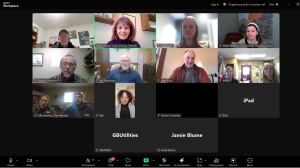2025 Clayton County Municipal Electric Utility Forum
 Clayton County maintains many features unique to the state of Iowa, from picturesque trout streams meandering through rocky bluffs to their electric utility landscape. Unlike surrounding counties, Clayton County contains three types of electric utilities: investor owned represented by Alliant Energy, a rural electric cooperative (REC) known as the Allamakee Clayton REC, and municipal electric utilities (MEU). Specifically, municipal electric utilities operate in three Clayton County communities, Guttenberg, McGregor, and Strawberry Point. The number of MEUs operating in the county is two times higher than the Iowa average, but what does this mean for Clayton County? The Clayton County Energy District (CCED) has long recognized this as an opportunity to explore local utility ownership, renewable generation, and transmission enhancements tailored to individual communities through the MEU structure.
Clayton County maintains many features unique to the state of Iowa, from picturesque trout streams meandering through rocky bluffs to their electric utility landscape. Unlike surrounding counties, Clayton County contains three types of electric utilities: investor owned represented by Alliant Energy, a rural electric cooperative (REC) known as the Allamakee Clayton REC, and municipal electric utilities (MEU). Specifically, municipal electric utilities operate in three Clayton County communities, Guttenberg, McGregor, and Strawberry Point. The number of MEUs operating in the county is two times higher than the Iowa average, but what does this mean for Clayton County? The Clayton County Energy District (CCED) has long recognized this as an opportunity to explore local utility ownership, renewable generation, and transmission enhancements tailored to individual communities through the MEU structure.
In support of this unique opportunity the CCED, partnering with the Clean Energy Districts of Iowa (CEDI), hosted utility representatives from the three Clayton County MEUs in a collaborative forum on January 21. The forum explored each utility’s landscape, detailing their grid, generation source, and annual sales. Each utility reported different factors such as power purchase structures, challenges, and adoption of distributed renewables. Inherently, the municipal structure tailored to meet each community’s needs will result in very different solutions for each municipal electric utility.
To develop these unique solutions and create a thriving local energy grid, the CCED and CEDI invited expert speakers to provide detailed information on potential opportunities. Utility consultant Warren McKenna, who championed highly successful efforts at Farmers Electric Cooperative in Kalona, IA and many others across the state, shared his experiences helping locally owned utilities achieve their goals for resiliency, efficiency, and generation. In Warren’s wise words, “an old, municipally owned utility without a feasibility study is like an old house without an energy audit”.
CEDI Executive Director Andy Johnson shared multiple resources for technical assistance and funding to reduce costs on feasibility studies, energy resources, grid resiliency, and energy storage. One option was presented by CEDI’s Energy Efficiency and Conservation Block Grant (EECBG) Program Manager Abby Steffens. “Clayton county has a unique municipal utility landscape that is valuable in implementing CEDI’s mission. Our grant is able to provide a launchpad for efficiency and renewable projects for their service territories. I am excited to explore how our EECBG funds can seek and support potential projects with these organizations to encourage the relationship with and enhancements to energy use in the county.”
Finally, CEDI Board Chair Al Buss shared a story from the Vernon County Energy District (VCED) in Wisconsin, where he also serves as Board Chair. Following recurring flood emergencies, the Village of Le Farge, WI, in partnership with the VCED, is pursuing funding for a microgrid structure and backup storage solutions to provide consistent service and lower energy prices. The proposed project would produce between $100,000 and $250,000 in energy revenue for the village annually. Le Farge is pursuing grant funding for the majority of the project, so the remaining upfront investment required from the city is only about $500,000.
The CCED will continue conversations with Clayton County MEUs to promote and assist in funding feasibility studies. In the words of CCED Board Chair Jim Osterhaus, “The CCED is offering no risk feasibility studies to explore opportunities for improvement and determine areas of need, there is no downside”. To compliment feasibility study funding, CEDI is creating an online resource to consolidate other funding opportunities for public entities across the network. As the need for greenhouse gas emission reduction and increased efficiency grows, local ownership and energy autonomy becomes increasingly crucial to addressing community energy challenges. The Clayton County Energy District continuously champions the effort to expand access to locally owned, clean energy technology for all.

 Next Post
Next Post